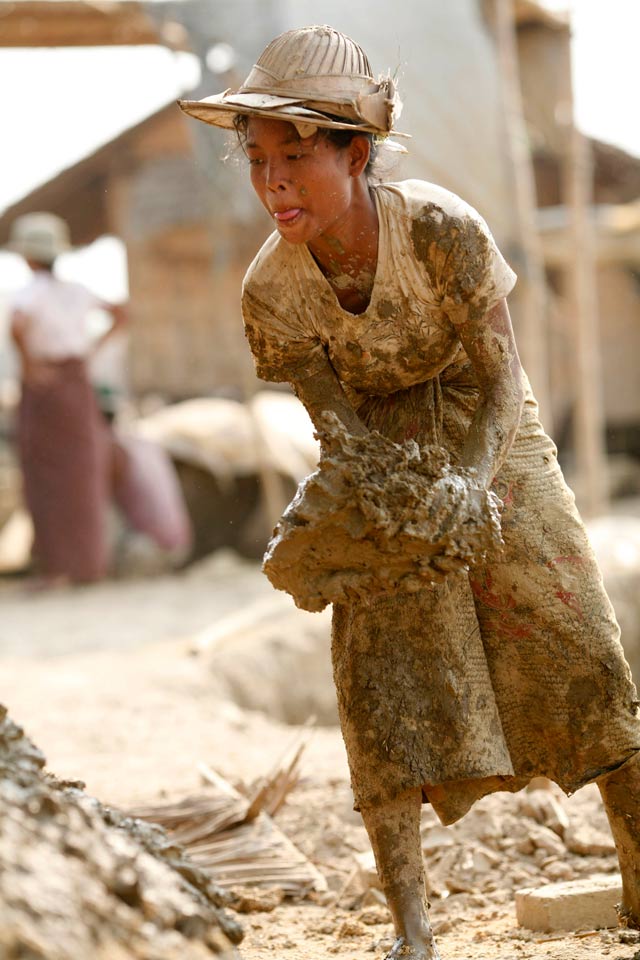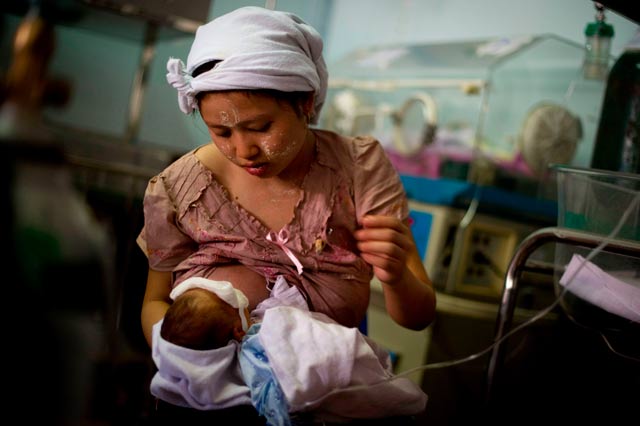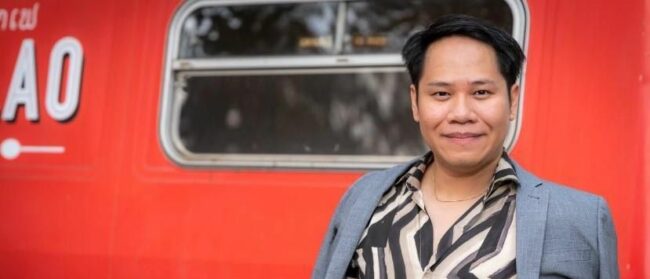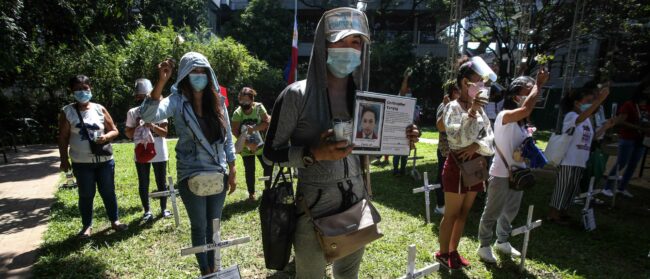Nine months after President Thein Sein took office as the head of a nominally civilian government in March 2011, reports emerged that the Burmese military were keeping four women as sex slaves near the Kachin-China border.
On November 1 last year a member of the Kachin Women’s Association Thailand was monitoring a military camp through a zoom lens when she witnessed Sumlut Roi Ja being dragged by four soldiers into a bunker.
Reports have since emerged that alongside three other women, she has been forced to cook and clean during the day and been gang-raped at night.

The military denies abducting the 28-year-old mother of one, and the country’s Supreme Court has dismissed a lawsuit filed by her husband. Activists say this is yet another example of the courts protecting the military’s employment of systematic sexualised violence against women.
“The judiciary has been firmly entrenched as a key tool of the military in Burma since 1988 when the military junta suspended the 1974 constitution and declared martial law, taking for itself all legislative, administrative and judicial powers,” said Phyu Phyu Sann, a Myanmar researcher at the Global Justice Centre. “Like Stalin, sergeant-general Than Shwe perfected using judges as a weapon of choice for purging the population and those deemed a threat to his regime. The judiciary remains the same under the current civilian government.”
The constitution requires the highest judicial officers to have at least ten years experience, meaning only those who served under the military regime prior to 2008 are eligible. “These judges are the same judges complicit in ordering the false arrest and imprisonment of innocent civilians, including Daw Aung San Suu Kyi,” said Phyu Phyu Sann.
The junta’s failure to prosecute gender-based crimes has created a culture of impunity that fosters violence against women, said Charm Tong, an award-winning human rights activist at the Shan Women’s Action Network. Reports of women subjected to rape as a weapon of war were common during the country’s successive military regimes. With ceasefire failures in Shan State and Kachin State, reports of rape have increased in the past year – a period in which many Western governments have lauded Myanmar’s ‘reformist’ government.
“Ethnic regions are still not safe places for women, as the fighting is ongoing and human rights violations at the hands of the Burmese Army is growing,” said Lway Aye Nang, an advisory board member of Palaung Women’s Organisation. Increased military presence in Kachin State and Shan State – where one-quarter of Burmese Army troops are currently stationed – is directly linked to an increase in human rights abuses against local populations. Since Thein Sein took power, the US Campaign for Burma has reported 40 cases of sexual violence, the majority of which have occurred in the northeastern states; though the actual figure is believed to be higher.
In the areas surrounding Tasang dam on the Salween River in southern Shan State, the number of reported rape cases swelled with increased militarisation of the area when national soldiers were deployed as private security for the Chinese-backed, $9-billion dam project.
“Women in rural areas suffer from systematic human rights abuses such as massive forced relocation, torture, forced portering and sexual violence committed by the Burma Army troops,” Charm Tong said. “More investment [in the energy sector and extractive industries in ethnic areas] means more military, which means more human rights abuses, more sexual harassment, more human trafficking and more rape.”
While Charm Tong welcomes investments that create job opportunities within a sound labour law framework, there is a fear that by lifting sanctions Western governments have legitimised military brutality. Activists are urging potential investors to ensure their investments do not prop up the old guard and are not linked to human rights abuses.
“The military uses violence against women to suppress, humiliate and impose fear on women and the rest of society,” said Zoya Phan, campaigns manager for Burma Campaign UK. “Once women have been degraded through physical attacks and insults, they may never recover. It is psychological warfare as well as physical warfare.
“Changing the military’s policy of discrimination and sexual violence against women is one of the most important reforms that need to be taken if we ever want to see real progress in Burma. “However, Phyu Phyu Sann said the chances of the ruling elite championing women’s issues as part of the current wave of legislative and administrative reform are slim to none, as it would involve far deeper, fundamental changes to the system. “Since the constitution was purposefully crafted to be difficult to amend, moving towards true democratic reform is unlikely,” she said.
Not only does the 2008 constitution fail to guarantee or promote gender equality, it discriminates against women in the public sector, Phyu Phyu Sann said. A major barrier to civil service employment is a clause that states ‘nothing shall prevent the appointment of men to positions that are suitable for men only’, failing to mention whom or what determines which positions are not suitable for women. Further, the constitution provides blanket amnesties for all junta- and government military-related crimes, including sexual violence against women during times of conflict.
“This is an aggressive and deliberate act by the military regime of Burma to enshrine impunity as a ‘right’,” said Phyu Phyu Sann, adding the United Nations is prohibited from recognising the legitimacy of the constitution in any way given its amnesty provision.
Amendments to the constitution are unlikely as they can only be approved by a vote of more than 75% of all the representatives of the Union Parliament, effectively giving a veto power to the military with its 25% of seats.
The militarisation of parliament is no surprise to observers, who have witnessed the gradual militarisation of all aspects of Myanmar society since the generals came to power in 1962. With the army exercising constitutional control over every level of government, dominating public and political life, Myanmar is very much a military man’s world. Except for honorary positions, women are not allowed into the armed forces, which prevents them from holding top positions reserved for active and retired military officers and are automatically excluded from holding many government positions – meaning that Aung San Suu Kyi can never become vice-president or president. When the former generals swapped their military fatigues for civilian garbs in 2010, in Thein Sein’s reformist elected government, women constituted only 2.7% of those in parliament.
“The militarisation of Burmese society has contributed to the marginalisation of women,” said Phyu Phyu Sann. “There have been no changes under the current civilian government.”
According to Charm Tong, this means that real power in Myanmar remains in the hands of the 11-member National Defence and Security Council, which is controlled by military or ex-military personnel and enjoys complete legal autonomy. “They are all men. Their agenda is simply to maintain their vested interests,” Charm Tong said.
The concerns of women have been ignored by the current government and are rarely raised by any political parties in Burma, said Zoya Phan. However, with Aung San Suu Kyi’s National League for Democracy selecting at least 13 female members of parliament in April’s by-election, as well as increased participation of women in social affairs and politics, and a grassroots women’s empowerment movement, there is hope that this may change. While in Europe as part of a fact-finding tour last month, the third highest-ranking member of the old military rule and current lower house speaker, Shwe Mann – who is tipped to replace Thein Sein as president in 2015 – told Norwegian newspaper Aftenposten that Myanmar has “learnt that the role of women in Norway has supported your development in many ways”.
While this is a welcome sign that the government may finally be acknowledging a woman’s worth, until this is reflected in the constitution, “women must help themselves, empower each other and educate themselves about their rights and the importance of their participation in social, economic and political sectors,” said Zoya Phan. Meanwhile the main challenge for Western governments that have eased sanctions is to retain leverage in pushing for change and the removal of obstacles to democracy and rule of law.
“The most important barrier to success is, ironically, the constitution itself,” says Phyu Phyu Sann. “The international community must invest in a democratic future for Burma by insisting that Burma abide by international law and by supporting constitutional reform. The National League for Democracy and Suu Kyi [are operating in] an unstable political situation, one that pits their goals against those of a still-dominant military. The military is flourishing under constitutional protections and guarantees of impunity for past and future crimes. Armed conflicts will continue between the military and ethnic groups, [as will] military attacks on civilians, including the use of rape as a weapon of war.”
Even with foreign and domestic pressure, is it too soon to expect the ‘reformist’ movement to initiate policies to protect women, promote gender equality and tackle women-targeted violence? Lway Aye Nang believes it is: “It is too early to demand this at this stage, as the government is the perpetrators of all these crimes.”
PAPER TIGER
In September 2011, the Burmese regime established the Myanmar National Human Rights Commission to promote and safeguard the fundamental rights of citizens in accordance with the 2008 constitution. However, it is a body that lacks teeth: it is not independent and therefore cannot carry out investigations into human rights violations as it lacks a mandate to examine abuses committed before its establishment and will not investigate human rights abuses in ethnic areas,” said Lway Aye Nange, an advisory board member of Palaung Women’s Organisation.
STATE COFFERS: A PRIVATE PURSE
For more than 60 years, successive dictatorships in Myanmar have spent excessive sums on the military instead of allocating national revenue for social and economic development for the people. “Subsequently the most urgent issues facing women include security and protection of their rights, humanitarian problems such as lack of healthcare, especially pre-natal and post-natal assistance, and access to education,” said Zoya Phan, campaigns manager for Burma Campaign UK. “Low literacy and high poverty have also forced many young women to become victims of human trafficking, including as sex workers.”
A WOMAN’S WORK
“When travelling around Myanmar, it is common to see more women than men working on the construction of roads. This is not a sign of equality, where a woman is doing a man’s job as is the case in many countries. It is because women are paid a third less than men, they are a source of cheap labour – this needs to change. Laws regarding equal wages need to change,” said Zoya Phan, campaigns manager for Burma Campaign UK.


